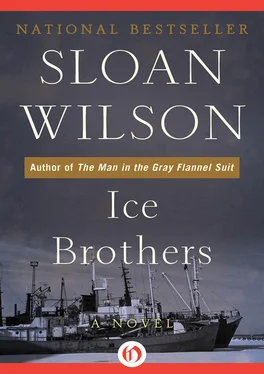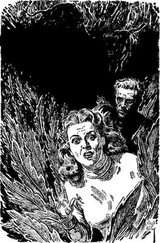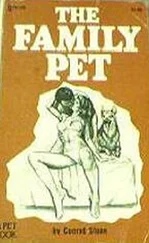Maybe more important things happened to Sylvia during her eighteenth year than discovering that not all the doors in the world were open to her, Paul sensed. Perhaps she had her first real love affair and was severely hurt by it. She never mentioned such a thing, but there were weeks when she didn’t see Paul, pleading that she was ill or had other engagements. His brother, Bill, as usual had something hurtful to say.
“I hear Ted Barrington is taking her out. He’s a real cocksman. I bet he’s breaking her in.”
Ted Barrington was a varsity football player at Harvard and the son of a famous Boston lawyer.
“Ted took me out just once and we didn’t do anything but go to the movies,” Sylvia said when Paul asked her about him. “He’s a bore and a snob. I hope I never see him again.”
Paul was already learning that one either believed Sylvia or one did not, but there was no point in questioning her. One either loved her or not, and he did, although he often wondered whether he really liked her. And there was one result of the mysterious loss of confidence she suffered which delighted him; more and more she began to depend on him and to spend more time with him.
In the summertime she often went as cook on short cruises aboard the yawl, and in the fall when no more paying passengers could be found, they often spent their evenings alone together on the boat. Paul did not find it easy to seduce her, but impossible not to. When he first took her to bed he felt he was claiming her for himself forever. No matter what precautions they took, she was terrified of getting pregnant, and she admitted that it was that continuing terror more than anything else which finally made her want to get married.
Everyone Paul knew tried to talk him out of marrying Sylvia. He himself realized that they were of course too young, and that maybe they were almost as crazy as Bill said they both were, but his obsession with her continued and was strengthened by other feelings. He was afraid he would lose her. Now that she had graduated from high school and had more or less dropped out of the round of parties which had sustained her so long, Sylvia had begun to think of marriage as a salvation. He suspected that if he didn’t marry her, she would soon take up with somebody else, almost anyone who would marry her. There was something pathetically vulnerable about her. Bill said it looked as though she was having a nervous breakdown, and maybe she was coming close to that. Paul wanted to protect her. He realized that a desire to protect a pretty girl must be regarded somewhat sardonically, but it was true that she obviously needed someone to take care of her.
Paul was aware that the circumstances of his wedding were not auspicious. Her family was almost as much against it as his own, except that they possibly understood her better, and were glad to see her get settled, even though they didn’t approve of her penniless choice. Almost all their friends assumed that she was pregnant. The whole little ceremony in her father’s living room was subdued, almost shame-faced, with nothing like the excitement which followed the news of Pearl Harbor.
Yet Paul was happy and Sylvia seemed happy for about six months, before she was overtaken by a terrible restlessness. She couldn’t get used to the fact that Paul had to work much of the time. Once more she wanted to go to parties — as a young matron, the wife of a man who came from an old Boston family, even if he had no money, she regained some of her self-confidence. Her brothers, who had seen her moping about the house, encouraged her. She just went out with old friends and relatives, or that’s the way it started.
Where it was ending, Paul was not at all sure. The truth was that his entire past became more and more confusing the more he thought about it, and until now his future had been even more bewildering. But this new thing, war, made at least the immediate future clear. He would be a Coast Guard officer. Whatever else the war did to him, it would get him away from home for a few years and give both him and Sylvia a chance to grow up, almost as though their marriage had never taken place. When he came home, maybe a hero, for heaven’s sake, they might have changed enough to work out a way of life they both wanted.
“There’s a war on,” he said to Sylvia when she questioned his haste. “I might as well go and try to get it over with. College just doesn’t seem to make much sense to me anymore.”
Late in March Paul felt elated when he got a letter from the Coast Guard which formally commissioned him and told him to buy his uniforms. A long list of required equipment, including a dress sword, was enclosed, but no money for the purchases. Officers were expected to buy their own uniforms, and the Coast Guard had not yet got around to deciding that swords were unnecessary for World War II.
After a moment of thought, Paul called his mother in the nearby town of Milton, explained the situation and asked if he could borrow five hundred dollars. Because he almost never asked her for money, she was surprised, but after a short pause, said, “For that purpose we can always find a few dollars. We’re so proud of you, Paul! Come out and see us as soon as you get one of those uniforms on. It’s been ages since we’ve seen you.”
He was ashamed of himself for visiting his parents as seldom as possible. That was one of the bad things about him, along with getting married before he graduated from college, dreaming about sailing around the world instead of getting a good job, and not wanting to live a respectable life in the suburbs. Still, the image of himself which looked at him from the mirror of the military tailor did not seem like such a disreputable young man. This Coast Guard ensign with the close-cropped blond hair appeared much too young for the broad gold stripe on his blue sleeves, but he didn’t look like a villain either. When Paul put on his new cap with the gold strap and the big gold eagle, tilting it to the proper angle, the young officer in the mirror looked as though he might actually belong aboard a ship.
The tailor agreed to turn up the cuffs of one pair of pants immediately. The dress whites and the sword which his list called for would take a few days to get. Soon Paul was driving to see his parents.
The small, brown-shingled cottage would have appeared shabby if it had stood on a suburban street, but in its country setting surrounded by a grove of pines it had a certain charm. His mother, Rachel, a big blocky woman dressed in shaggy tweeds, had been watching from the window and opened the front door before he touched it.
“Paul!” she said. “How beautiful you are! I feel I should salute!”
Never before had he received such approval from his mother and he did not quite know how to handle it. When he hugged her, her tweeds felt as rough as a burlap sack, and she pulled away before he could kiss her big broad cheek.
“Come see your father,” she said. “He’s in his studio. His work has been going very well lately and he’s been hard at it all week.”
His father, or the father she presented to him, was almost entirely a work of fiction, he realized with the strange new ability to face facts which his commission had apparently given him. Charles Schuman actually did no work, had not done any for at least ten years. After going broke and losing his job in a brokerage house in 1929, he had retired on the slender income his wife had inherited, and had taken up painting. At this he was a genius, according to Rachel, but he was so ahead of his time that galleries and art museums didn’t understand him. For about two years Charles had experimented with cubism and many kinds of abstractions. When his work brought him neither money nor praise, he busied himself with woodcarving, furniture repair, fishing and hunting. As a mild-mannered man who at least had weathered failure in a family where that was the worst of all crimes without going crazy or taking seriously to drink, he was worthy of respect, and Paul wished that his mother could let his sons love him for what he was instead of pretending that he was a hardworking artist whose genius would undoubtedly be recognized after his death.
Читать дальше












